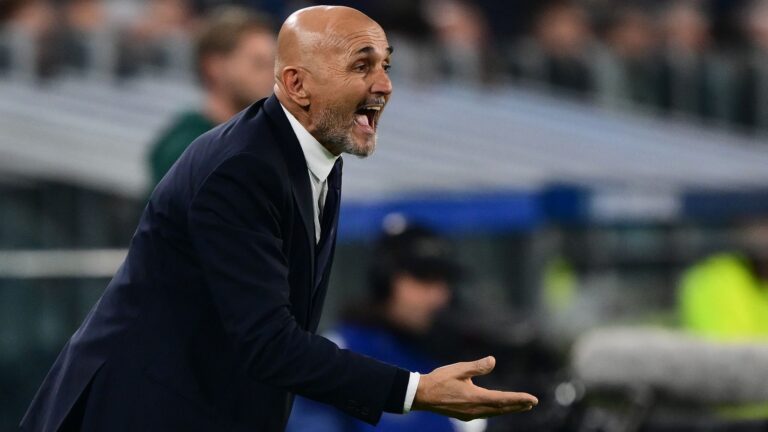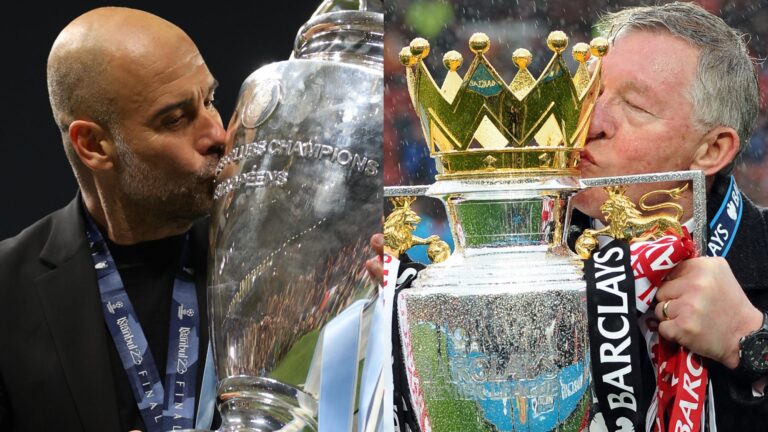


Adapting to Tactical Shifts: Arne Slot’s Blueprint for Liverpool’s Defensive Evolution
In the midst of Liverpool’s challenging phase in the Premier League, Arne Slot emphasizes the need for his team to refine their approach to countering defending ‘long balls’. The squad began the season with a strong title defense, securing victories in seven consecutive games across various tournaments, but a sudden decline hit by late September, marked by three straight losses in the league, including a narrow 2-1 home defeat to Manchester United-ending a nine-year drought for the visitors-and a setback against Galatasaray in Europe.
Liverpool’s Form Fluctuations and Recent Breakthrough
The team has now broken their run of defeats with an impressive 5-1 triumph over Eintracht Frankfurt in the Champions League, injecting fresh confidence. In the wake of this uplifting result, Slot is pushing his players to master defenses against long-ball strategies as a key to reversing their domestic struggles.
Contrasts in Opponent Approaches This Season
Drawing from his analysis during downtime, the Dutch manager pointed out stark differences in rival tactics compared to the previous campaign. He noted that Liverpool has faced 178 long balls over seven matches, spiking to 59 against Manchester United, a sharp contrast to earlier periods last year. Slot explained that overcoming these setups often requires a flash of brilliance, similar to moments driven by players like Mohamed Salah previously, or capitalizing on set-pieces, as seen in the Frankfurt game where such plays shifted the momentum against a compact defense.
Explaining Adjustments to the Squad and Public
Slot shared that his post-game discussions aim to clarify these issues for both the team and the press, viewing the opposing coach’s tactics as a clever counter to Liverpool’s style. He remarked on the commonality of such strategies, citing conversations between Frankfurt’s staff and their leader as standard practice in modern football.
Strategic Modifications and Lessons from Rivals
To address these challenges, Slot stressed the importance of evolving their game plan, which they have begun to implement. For instance, in recent encounters with a 5-4-1 formation against teams like Crystal Palace and Manchester United, Liverpool generated more opportunities than in similar situations last season despite the low blocks. This improvement stems from subtle tweaks to their tactics, with even greater changes applied against Frankfurt, though he credits their chance creation to overall adaptability rather than a single factor.
Learning from Elite Teams
Slot acknowledged that this isn’t a unique problem, drawing parallels to how Manchester City has mastered navigating crowded defenses over years. He urged his side to enhance their proficiency in these confined areas, positioning it as a vital area for growth to stay competitive.
Slot’s Response to the Anfield Setback
Following the frustrating loss at home to an underperforming Manchester United, Slot opted to frame the opponents as reliant on long-ball plays rather than dwelling on his team’s shortcomings. In his BBC Match of the Day interview, he described the difficulty of breaking down a deep defensive line combined with frequent long balls, especially after conceding early. Despite creating numerous chances, defensive lapses, including from set-pieces, led to the defeat, highlighting the fine margins in such matches.
Upcoming Opportunities for Redemption
Liverpool’s next test comes in the Premier League on Saturday, where they travel to face Brentford, offering a chance to apply these lessons and stabilize their campaign.
Arne Slot’s Tactical Focus on Liverpool’s Defensive Adaptations
Understanding Arne Slot’s Philosophy on Defense
Arne Slot, the current Liverpool manager, has been vocal about the evolving demands of Premier League defenses, particularly in countering long balls from opponents. Since taking over from Jürgen Klopp, Slot has brought a fresh perspective to Liverpool’s tactics, emphasizing adaptability as a core principle. Long balls, often used by teams like Manchester City or Arsenal to bypass midfield pressure, pose a significant threat in high-stakes Premier League matches. Slot’s approach highlights the need for defenders to stay sharp and proactive, blending traditional zonal marking with more dynamic responses.
In recent training sessions and press conferences, Slot has stressed that defending against long balls isn’t just about physical prowess; it’s about anticipation and quick decision-making. For instance, he often points to how Liverpool’s backline must read the game faster to prevent opposition strikers from gaining an advantage. This tactical shift is crucial for Liverpool’s Premier League challenges, where teams frequently exploit long-ball strategies to create scoring opportunities.
Key elements of Slot’s defensive philosophy include:
- Anticipatory positioning: Encouraging defenders to predict long-ball trajectories based on opponent’s patterns.
- Improved communication: Ensuring full-backs and center-backs coordinate seamlessly to avoid gaps.
- Hybrid defensive setups: Mixing man-marking with zonal play to disrupt long-ball plays effectively.
The Rising Threat of Long Balls in Premier League Tactics
Long balls have become a staple in Premier League challenges, with teams using them to transition quickly from defense to attack. This tactic, popularized by managers like Pep Guardiola, forces defenses to react under pressure, often leading to counter-attacks. For Liverpool under Arne Slot, adapting to these long-ball threats is essential for maintaining their competitive edge in the league.
Statistically, long balls account for a significant portion of goals conceded in the Premier League, with data from recent seasons showing an increase in their usage. Slot has noted that opponents are getting smarter, using long balls not just as Hail Mary passes but as calculated moves to exploit defensive weaknesses. This evolution requires Liverpool’s players to enhance their aerial duels and ground coverage, turning potential vulnerabilities into strengths.
To break it down further:
- Aerial dominance: Long balls often target the penalty area, so Slot focuses on winning headers and clearing lines efficiently.
- Speed in recovery: After a long ball is dealt with, Liverpool must quickly regain possession to prevent transitions.
- Opponent analysis: Slot’s team studies footage of rivals like Chelsea or Tottenham, identifying patterns in their long-ball executions.
Strategies for Enhancing Liverpool’s Defense Against Long Balls
Arne Slot is implementing specific strategies to bolster Liverpool’s defenses against long balls, drawing from his successful tenure at previous clubs. These include tailored training regimens and on-pitch adjustments that address Premier League challenges head-on. By focusing on these areas, Slot aims to make Liverpool’s backline more resilient and versatile.
One effective method is incorporating high-intensity drills that simulate long-ball scenarios. For example:
- Defensive drills for long-ball scenarios: Players practice intercepting passes mid-air and transitioning to attack, helping build muscle memory for real matches.
- Role-specific training: Goalkeepers like Alisson are coached on claiming crosses, while center-backs focus on shielding the box.
Under Slot’s guidance, player roles are being redefined to counter long balls more effectively:
- Center-backs as first-line defenders: Virgil van Dijk and his partners are trained to step out and engage earlier, disrupting the opposition’s rhythm.
- Full-back support: Players like Trent Alexander-Arnold provide width and cover, ensuring long balls don’t lead to wide overloads.
Additionally, Slot emphasizes mental preparation:
- Psychological edge: Building confidence through video analysis of successful defenses against long balls in past games.
- In-game adaptations: Using substitutes to refresh the defense if long balls become a dominant threat.
Measuring the Impact of Slot’s Defensive Adaptations
To evaluate how Arne Slot’s emphasis on adapting to long balls is affecting Liverpool’s overall performance, it’s helpful to look at key metrics and on-field results. This focus has already shown promising signs in Premier League fixtures, where Liverpool’s improved defensive solidity has reduced goals from set pieces and direct plays.
Slot tracks progress through performance indicators such as:
- Conceded goals from long balls: A notable decrease in recent matches, attributing to better positioning and anticipation.
- Defensive success rates: Metrics like interception rates and aerial win percentages have risen, directly linking to Slot’s training methods.
Further details include:
- Case studies from matches: In games against teams that rely on long balls, Liverpool has adapted by pressing higher, forcing errors.
- Long-term benefits for Premier League challenges: This strategy could help in cup competitions, where long-ball tactics are common.
Future Considerations for Liverpool’s Defensive Evolution
Arne Slot is pushing for ongoing refinements in how Liverpool handles long balls, integrating technology and data analytics into their preparations. By analyzing Premier League trends, Slot ensures that defenses remain ahead of the curve, adapting to new challenges as they arise.
For deeper insights:
- Data-driven adjustments: Using tracking software to monitor long-ball frequencies and player responses.
- Youth development: Incorporating these tactics into academy training for sustained Premier League success.
This approach not only addresses immediate threats but also builds a foundation for Liverpool’s long-term dominance in the league.









